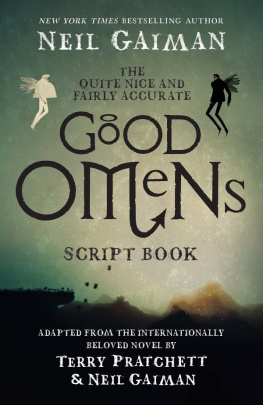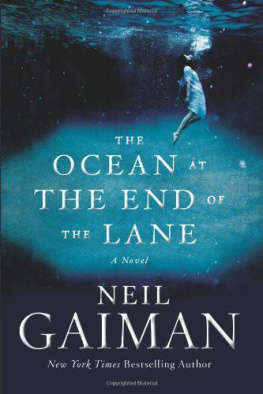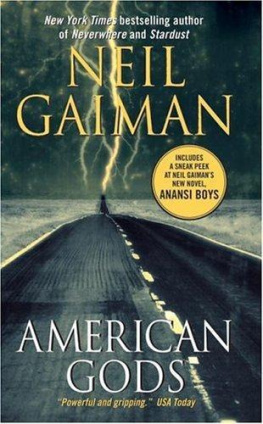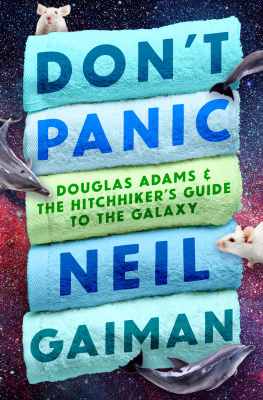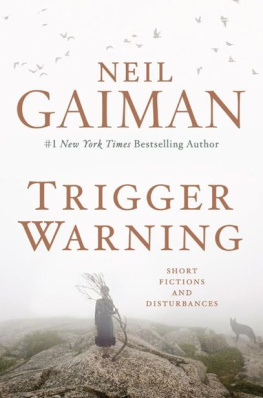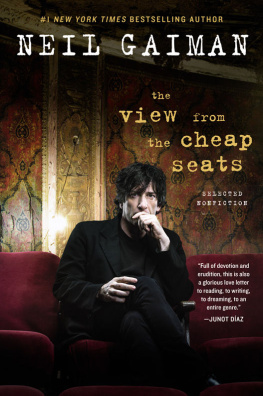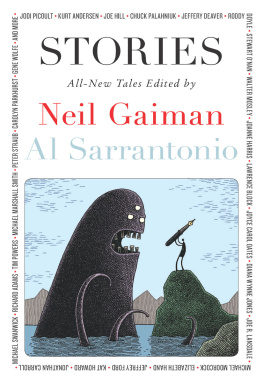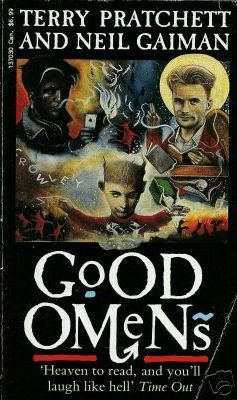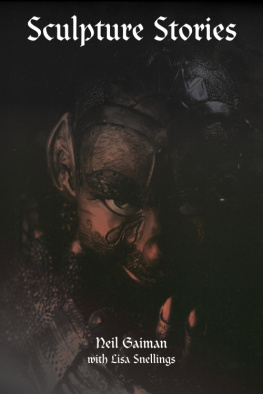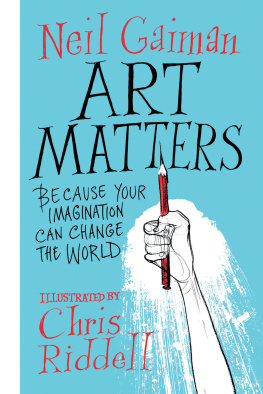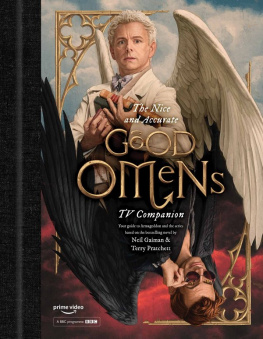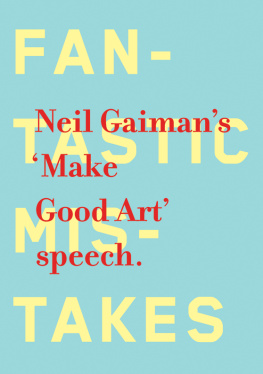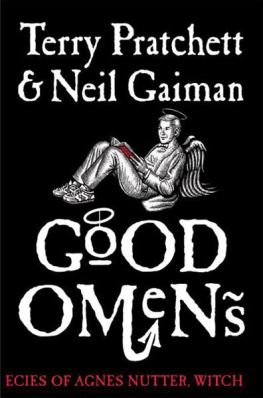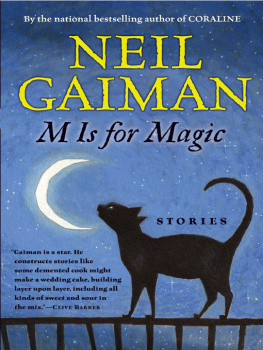For Terry Contents I am writing this in December of 2018. The world is in its Christmas plumage, and Im living in a hotel. Today, for the first time, when I told someone when I thought Good Omens would probably air, the reply was, Thats soon. Im so used to people saying, Thats such a long way away. Weve handed in Episodes One and Two, and tomorrow well do the final tweaks and polishes, spit-on-a-tissue-and-scrub-its-face things, and send Episode Three out for quality-control checks, because the last graphic we were waiting for Famines name, with a skeletal horse moving behind it came in this afternoon. (I will, I have been told, be making the bunny noises in Bang Post Production in Cardiff on Thursday.) So many tiny details that need to be in place to take our six-hour story over the finish line. (I will, I have been told, be making the bunny noises in Bang Post Production in Cardiff on Thursday.) So many tiny details that need to be in place to take our six-hour story over the finish line.
So, when I look at the scripts now, they seem familiar, but half-remembered things like places I lived a long time ago. And I suppose, in a way, they are exactly that. The people who are making Good Omens are building a glorious edifice, a huge and unlikely place, part temple and part nightclub and a great deal of it is bookshop, and the six scripts are our original architectural diagrams: much-thumbed and creased, with grease-pencil marks on them to show wherever the builders had needed to change things. But they didnt give you any idea of the splendour of the building, or the colours it would be painted. Terry Pratchett asked me to make a Good Omens television series in August 2014. He wrote, I know, Neil, that youre very, very busy, but no one else could ever do it with the passion that we share for the old girl.
I wish I could be more involved, and I will help in any way I can. It was a pragmatic letter: he knew that the Alzheimers was taking its toll on him. He had never asked me for anything before. He told me he wanted me to make it because he wanted to see it. I agreed. Id make it so that he could see it.
And then, in March 2015, Terry died. I flew home from the funeral and I started writing the first episode. Sixteen months later, in a house on the Isle of Skye, I finished writing the last episode. Only I didnt finish writing it. If you are writing television, you keep writing it. You write draft after draft.
And then its a week before the read-through and Douglas Mackinnon, our director, and I sat across from each other in a Camden kitchen, and rolled up our sleeves, and did a draft that acknowledged the realities of our budget. Scenes and characters went away (we had already cast the other Four Horsepeople of the Apocalypse, and lor were they scary and funny, but they went, and so did some of the rain of fish, and Aziraphale setting up his bookshop in the late eighteenth century and being given a medal. His medal was never given to him, but it was still in the bookshop). Scenes went because they would cost us too much (hint: avoid scenes on motorways). And then we shot it. And then we edited together what we had shot, and we learned things, and we didnt stop learning them.
We learned, for example, that even though we had shot our scenes showing Aziraphale in his Soho bookshop doing surreptitious miracles, and Crowleys rat-led invasion of the BT Tower and his taking all the mobile phones in London offline, the present-day story started exactly where it starts in the book: in a ruined graveyard, with the arrival of Hastur and Ligur. Somewhere, when we learned this, I knew, a twenty-seven-year-old me was smiling smugly. Those scenes are still in this script book. Thats part of the fun, isnt it? A script book like this is, or it should be, a tour behind the scenes of the scenes, the ones that made it into the final edit and the ones that didnt. It exists because I always loved script books: they gave you the missing bits and the cut scenes. As a boy and then as a teenager who wanted to, one day, make television and movies, script books were the only gateway I had to explain how the magical things that happened on the screen got there.
There are secrets in this book, and there are spoilers in the end, even for those who have read the original novel. The angels, for example. They werent in the novel. They were going to be in the next Good Omens book we wrote, only we never wrote it. We knew what they were going to be like. (At the insistence of the film company, who knew that people werent interested in used bookshops, Aziraphale worked for the British Museum. (At the insistence of the film company, who knew that people werent interested in used bookshops, Aziraphale worked for the British Museum.
Crowley owned a nightclub, although I cannot for the life of me remember why the film people thought this was a wise thing for him to do.) I was delighted to be able to bring the angels in now, the way Terry and I had originally talked about them. If you break Good Omens, the novel, down into six roughly equal parts, you will be surprised to discover an almost complete absence of Crowley and Aziraphale in part three. (It is almost as if we had written the novel like madmen, discovering it as we went, and then patched it into one story at the end.) This seemed like a problem in making it into television, as I knew from the start that our stars would be Crowley and Aziraphale, and I wanted them in each episode of the story. The way I fixed it was with the pre-credits sequence, which tells you a lot about the history of Crowley and Aziraphale on Earth over the last 6,000 years (although it omits more than it tells: I think its fair to assume that if, at any time in the last 6,000 years, anything interesting happened anywhere on Earth, Crowley and Aziraphale were probably there, not doing whatever it is they were actually sent there to do). If any of you are hoping to learn anything about scriptwriting from this book, I should warn you that there are jokes in the stage directions, and there shouldnt be. The people who know about these things will tell you not to do this.
But I like putting jokes into scripts: they tell everyone reading what kind of a thing this is, they keep me awake while Im writing, and sometimes they are a way of acknowledging that what Im asking for is impossible, but Im still asking for it. In the scripts, Buddy Hollys song Every Day runs through the whole like a thread. It was something that Terry had suggested in 1991, and it was there in the edit. Our composer, David Arnold, created several different versions of Every Day to run over the end credits. And then he sent us his Good Omens theme, and it was the Good Omens theme. Then Peter Anderson made the most remarkable animated opening credits to the Good Omens theme, and we realised that Every Day didnt really make any sense any longer, and, reluctantly, let it go.
Its here, though. You can hum it. Ive left the scripts more or less as they were when we were done shooting. Things changed, as I said, when we started editing. Scenes went away, they split apart, they joined up, they moved around, they did things that were nothing like what I had planned for them to do. If you compare what we did to what I wrote, youll get an idea of the editing adventure we went on.
The editing room is its own strange space, one in which we were always prepared to try things, to move them, to break them until they worked. And in the end, it seemed, they always worked, even if Episode One closes, and Episode Two begins, with two halves of a scene from later in Episode Two that was written to neither open nor close anything. Episode Six was too long when we edited it, and Episode Five was too short, and didnt quite work, so we moved scenes from the beginning of Episode Six to the end of Episode Five, and then both episodes worked delightfully. Nobodys seen the whole thing actually finished yet, not even me. It wont be done for another five or six weeks. I cant wait to find out what weve done.
Next page
